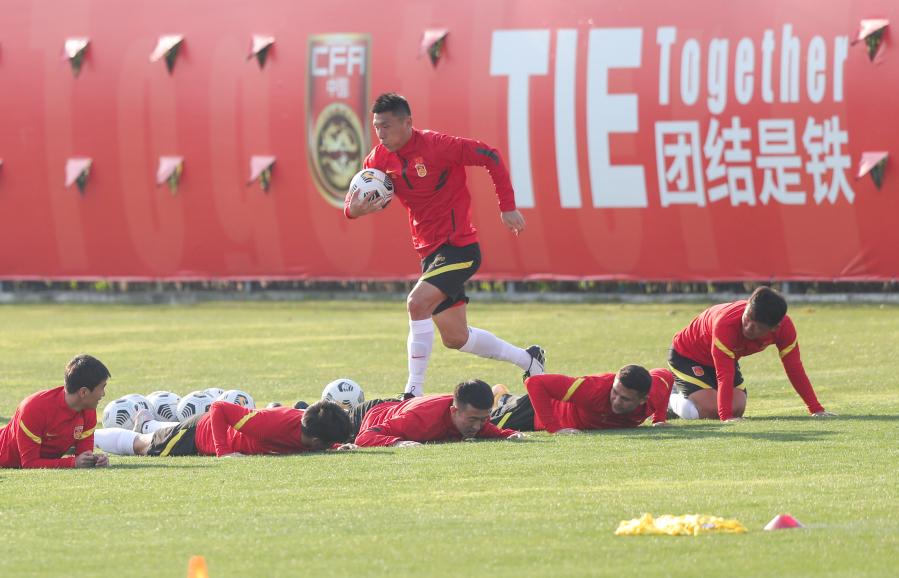FA chief vows to take China to World Cup final qualifying round

Chinese players in a training session during a training camp in Shanghai on March 22, 2021. (Xinhua/Ding Ting)
BEIJING, May 19 (Xinhua) -- Chinese Football Association (CFA) chief has vowed that its men's team will go all out to reach the final round of the Asian zone 2022 World Cup qualifiers.
China will play against Guam, the Maldives, the Philippines, and Syria in the remaining Asian Group A World Cup qualifiers, which will be staged in the east Chinese city of Suzhou from May 30 to June 15.
Even though China is currently eight points adrift of group leader Syria and only leads the Philippines on goal difference, CFA president Chen Xuyuan is confident that the Chinese team will advance to the final qualification round.
"There's no reason (for China) not to make it to the next round," Chen told Xinhua.
"First of all, Team China has the capability of qualifying. Secondly, the players have trained and prepared for more than a year with this firm goal. The coaching staff has also drawn lessons from past success and failure. The CFA has been working with Team China to provide the most professional resources possible."
"We often say we need to let the people see Chinese football is making progress. But if we get eliminated at this stage, the others will think we must be slipping instead of improving," he added.
There are 40 teams divided into eight groups at this stage of the Asian qualifying tournaments. The group winners will advance directly to the final round, while the four best group runners-up will also qualify.
China will have to keep a perfect record in the last phase as any loss or draw in the last four games would likely eliminate them from the competition.
"I look forward to the games, and I'm confident that the players will do well," said Chen.
He also confirmed that the CFA has earmarked prize money totaling 12 million RMB (about 1.8 million US dollars) to motivate the team.
"You can't say it's a big sum. I believe it's a rational sum," said Chen.
A lack of focus on developing homegrown talent and general football participation among the public is widely considered a root cause for China's underachievement in football.
Chen said that the CFA will make more efforts in fostering young talent. A nationwide youth league will be rolled out this year, with unified standards for all campus teams and academy teams across the country.
Meanwhile, permanent elite training camps will be established for different age groups all over the country, where youths will be able to train on a regular basis instead of the current short-term camps.
Another major task for the CFA is to select young talent and send them to train and gain experience overseas. "Our plan is to send dozens of young players to study and train abroad in the next year or two," said Chen.
Youth development is a matter of the present as well as a matter of the future, he noted. "Whether or not Chinese football will shock the world all depends on how we do in fostering the young talent at the moment."
THE LEAGUE
Jiangsu Suning won its first-ever top league title last year with victory over Guangzhou Evergrande in a playoff in November, but owner Suning announced it would withdraw funding from the Nanjing-based club at the end of February this year. After Suning failed to find a new investor to take over the club's debt, Jiangsu FC was left off the list of clubs approved by the league for the new season.
Chen, formerly president of Shanghai International Port Group (SIPG), which owns Chinese Super League side Shanghai Port FC, admitted that the vanishing of Jiangsu FC was "a huge shock" and led to extensive discussions.
"In the past few years, more than 10 football clubs have pulled out of professional leagues. What's the reason behind the frequent withdrawal of clubs? And how can we help the clubs and leagues build a healthy and sustainable model? That's what the CFA has been working on," he said.
"I believe, diversifying club ownership may be one of the most effective ways out."
With a single shareholder, a club is likely to teeter on the verge of collapse and rest with the shareholder's sole decision, while with multiple shareholders, a market-oriented corporate governance structure with a supervisory board and board of directors will be established so that major decisions (like pulling out of the league) must be made through a joint resolution of the shareholders, Chen stressed.
Apart from the proposal of diversifying club ownership, the CFA has already introduced a series of regulations to curb the unsustainable operation model of football clubs in the world's most populous country.
These rules include a limit on club spending, investor capital injection, club losses, and player salaries. For example, the new rules cap annual domestic player salaries at 5 million yuan (about 780,000 US dollars) and foreign player salaries at 3 million euros (23.49 million yuan), causing an exodus of many foreign star players ahead of this season.
Chen admitted that those policies have more or less affected the overall performance of league's games, but it's a good thing for Chinese football in the long run.
"The quality of some games were okay, but I guess some fans were not satisfied with the rest," said the 65-year-old.
"Our policies are not targeted at the elite players, but rather the illusory bubble the league has produced over the past years.
"The bubble will burst sooner or later. The quicker it bursts, the better for Chinese football."
Chen stressed that the CFA wants to remove the almost total reliance on cash injections from big businesses and force clubs to become more sustainable and professional.
"We hope professional clubs can achieve financial balance within three to five years. Only by making ends meet or achieving a substantial return on investment, more investors will then be willing to take part in football," he said.
The CFA chief believes that a key step to help the clubs achieve that goal is the launch of a national football lottery, an initiative that was outlined in the central government's reform plan for the sport.
"Relevant government departments have done a lot of research work on this matter since 2015, but there remain some details to be addressed," said Chen. "For instance, risk control and management, how we can prevent match-fixing as much as possible?"
"I don't know the timetable, but I hope the lottery will be launched as soon as possible."
Due to the COVID-19 outbreak, only two-thirds of the CSL games for the 2020 season were played in a bio-secure bubble. For the current season, games are being played in two hub cities - Guangzhou in the south and Suzhou in the east.
"We hope to bring back the home and away league format in the second half of this year. But it depends on the COVID-19 situation," said Chen.
Photos
Related Stories
- Zimbabwe permitted to use Chinese-built stadium in World Cup qualifier
- China head coach urges players to keep fit ahead of World Cup qualifiers
- China to take flexible approach to World Cup qualifiers, says head coach
- China to be camped in late May for World Cup qualifiers, says head coach
- 2022 FIFA World Cup qualifiers: Italy vs. Northern Ireland
Copyright © 2021 People's Daily Online. All Rights Reserved.










